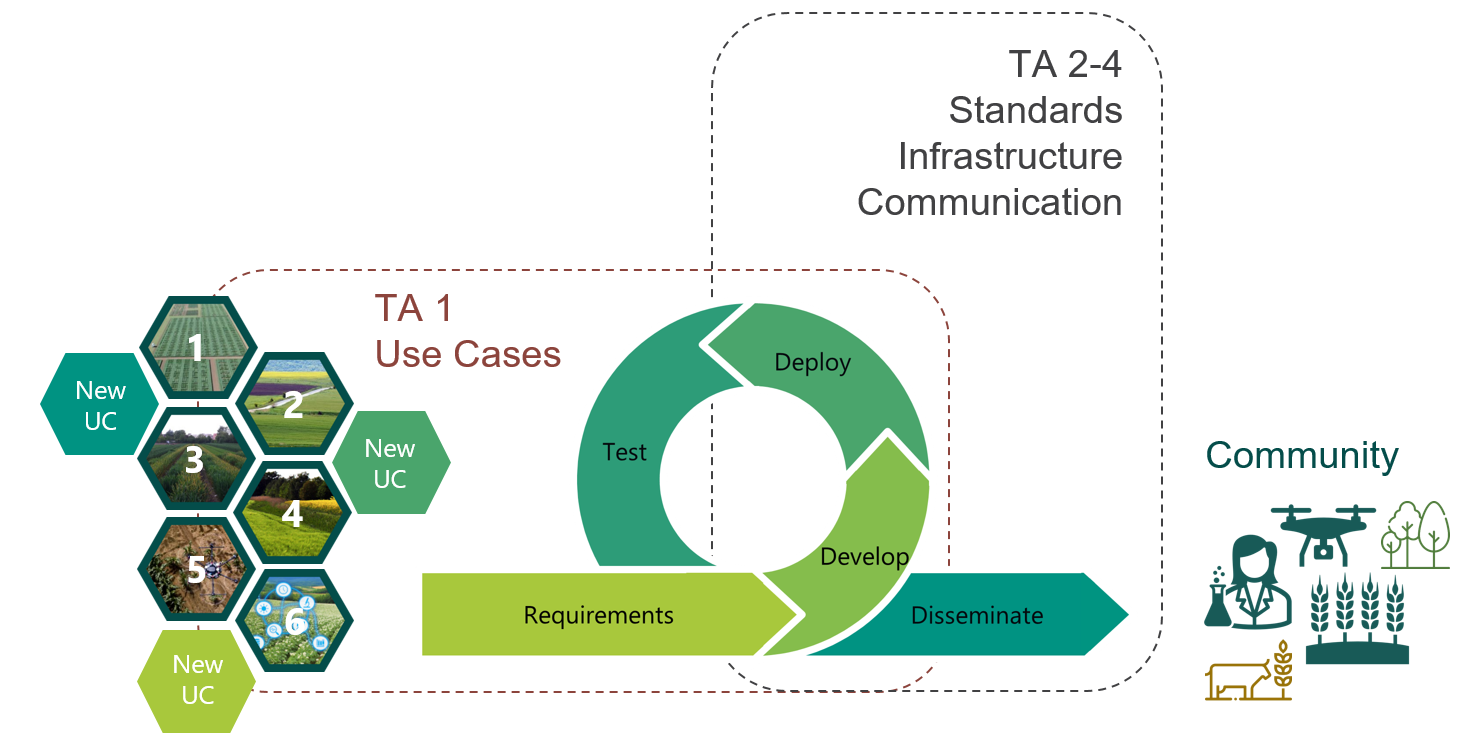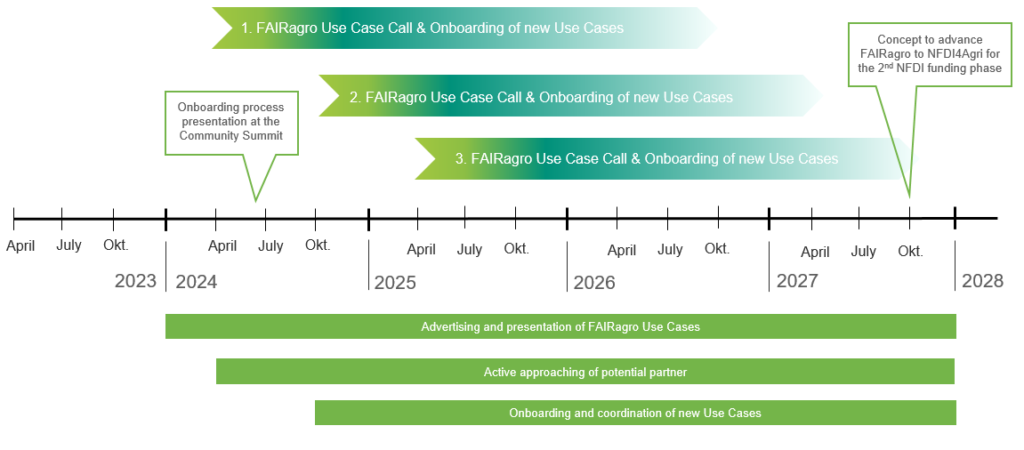This has been the call for applications with the application requirements and evaluation criteria.
This has been the application form for the FAIRagro Use Case Call as a Word document here.
The deadline for applications has expired on July 5 2024.
We will be happy to annonunce the new FAIRagro Use Cases in Mid-September!
FAIRagro is a community-driven initiative within the National Research Data Infrastructure (NFDI). The overall target is to establish an interoperable and scalable research data infrastructure and contribute to FAIR (Findable, Accessible, Interoperable, Reusable) research data management practices in agrosystem research and beyond.
The FAIRagro proposal with a comprehensive overview of the FAIRagro objectives and a detailed description of the different actions is published on Zenodo under ‘FAIRagro – A FAIR Data Infrastructure for Agrosystems (proposal).
In order to address the resulting challenges, initially six Use Cases were formulated, focusing on concepts and services developed by FAIRagro. These address issues such as data findability, accessibility, limited adoption of (meta)data standards, fragmented infrastructures, and legal uncertainties. These Use Cases demonstrate the potential of implementing FAIR standards and automating them to substantially increase research output across a wide range of activities in agrosystem science. They tackle domain- and discipline-specific challenges, scaled by the FAIRagro consortium to benefit the entire agrosystem community.
Objectives and purpose of new FAIRagro Use Cases
FAIRagro now offers the opportunity to tackle previously unaddressed challenges and disciplines in agrosystems research and beyond by onboarding new Use Cases.
Through this approach, new Use Cases can contribute by extending current FAIRagro developments and existing Use Cases, address new topics and challenges in research data management relevant to agrosystem research, and potentially broadening the scope of FAIRagro to encompass other disciplines and domains within agricultural sciences and beyond. Thus, potential Use Cases are important measures to:
- describe, address and cover the broad spectrum of current RDM challenges within agrosystem research and beyond based on practical examples,
- develop and test generic solutions and services to overcome the raised challenges,
- demonstrate and deploy advances and enhancements towards FAIR RDM practices in agrosystem research and beyond,
- disseminate and upscale developed solutions and assist with their implementation and application within the respective disciplines, and
- function as showcases for effective communication supporting the cultural change towards a FAIRer RDM in agrosystem research and beyond.

New Use Cases will be an integral part of the FAIRagro consortium, with all involved institutions being FAIRagro Co-applicants, or being, or becoming FAIRagro Participants, thereby expanding our consortium. By this means, Use Cases build on FAIRagro expertise to create and elaborate non-isolated solutions that can be easily adapted beyond a Use Case itself. Use Cases are integrated into the consortium’s work plan, entailing collaborative efforts with the Task Areas (TA) to accomplish specific Use Case (UC) measures and deliverables over a predetermined duration, during which they may receive FAIRagro support and funding.
Eligible Use Case Formats
In order to meet the needs of the vommunity and demands of an agile project management, two different Use Case formats are accepted:
| Use Case Pilots | Use Case Projects | |
| Description | Addressing a very specific single aspect of RDM challenges (´bricks` of RDM challenges) in agrosystem research and/or related disciplines with a rather narrow and precise scope. May include a theoretical and conceptual outcome in preparation of a subsequent UC project. | Addressing advanced RDM challenges in agrosystem research and or related disciplines. Producing measurable benefits and valuable outcome(s) for the community. |
| Details | UC Pilots can focus on single aspects of the UC cycle (Fig. 1) and may contribute to selected measures only. For example: – develop a concept for RDM solutions and services or – test developed solution and services for specific disciplines or in an interdisciplinary context or – upscale developed solutions to addressing new disciplines and communities or – disseminate enhancements across the community. | UC Projects should cover the whole UC cycle (Fig. 1) and contribute the all measures including: – describe and address RDM challenges within agrosystem research and beyond and – develop and test generic solution and services and – demonstrate advances and enhancements towards FAIR RDM practices and – disseminate and upscale developed solutions and – function as showcases for effective communication. |
| Scope | Narrow and precise | Broad and comprehensive |
| Focus | Selected measures of UC cycle | Whole UC cycle |
| Agility | Higher | Lower |
| Maturity | Lower | Higher |
| Outcome | Maturity / Concept | Product / Blueprint / Solution |
| Duration | 3 to 12 months Earliest possible start October 2023 | 1 to 2 years Earliest possible start October 2024 |
| Funding* | Max. 45.000€ for UC pilots | Max. 90.000€ per year Max. 180.000€ per UC project |
*Application for and expenditure of funds is tied to the corresponding calendar years. It is not possible to postpone funds applied for between budget years once they have been approved.
The table presents the most important differences between the two possible UC formats. Application, evaluation procedure, timelines, eligibility requirements and funding details are similar and can be applied for both UC formats.
Timeline
| Admission of new Participants: | Continuously |
| Announcement of the UC Call 2024: | 06.05.2024 |
| FAIRagro Community Summit: | 17.-18.06.2024, Berlin |
| Application deadline: | 05.07.2024 6pm |
| Announcement of UC selection: | Mid-September 2024 |
| Onboarding of new UCs: | From October 2024 |
| UC funding period and operation: | From October 2024 for max. 24 months |
| FAIRagro Annual Plenary: | 13.-15.11.2024, Berlin |

As the future use cases and thus the further development of FAIRagro should be supported by the broad FAIRagro community, the Community Advisory Board with representatives from the FAIRagro community will be involved in the assessment. The catalogue of criteria (e.g. added value compared to existing use cases, links to existing use cases, integration of new areas and communities, feasibility and strategic suitability) serves as the basis for assessing submitted use cases.


